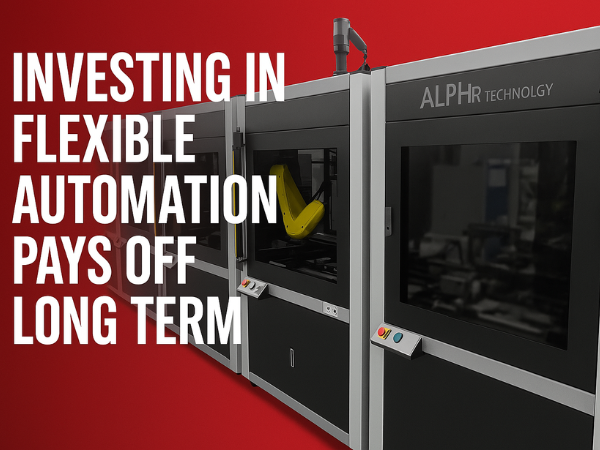At ALPHR, we’ve seen how flexible automation can revolutionise manufacturing processes, both in the short and long term. It’s not just about keeping up with industry trends; it’s about future-proofing your entire production line. Whether you’re managing a high-volume assembly line or navigating complex testing procedures, having the ability to adapt quickly and efficiently is more essential now than ever before.
Adapting to Change Without Starting from Scratch
The biggest advantage of flexible automation is that it doesn’t lock you into one rigid way of working. Unlike traditional automation systems that are built for specific tasks, flexible automation allows you to adjust and evolve your production line as your needs change. Whether you’re expanding your product range, introducing new materials, or dealing with unexpected supply chain disruptions, flexibility means you can make adjustments without overhauling your entire setup.
Think about it: without flexible automation, every time your product specs change, you’re stuck investing in new equipment or completely reprogramming your existing machines. That’s a costly and time-consuming process that can put you behind schedule and over budget. Flexible systems, on the other hand, let you make adjustments on the fly, keeping your line productive and your business agile.
Maximising Your Investment with Modular Systems
One of the most significant ways flexible automation pays off is through modularity. Modular systems allow you to add, remove, or replace components without disrupting your entire line. For example, if you need to introduce a new testing function or upgrade a specific module, you can do so without having to redesign the entire system.
This modularity isn’t just practical; it’s cost-effective. Instead of investing in a completely new machine every few years, you’re upgrading parts as needed. This keeps your initial investment working for you longer and maximises your return on investment. Plus, it’s much easier to justify smaller upgrades to stakeholders than massive capital expenses every few years.
Keeping Downtime to a Minimum
Let’s face it—downtime is the enemy of productivity. Every minute your production line is down, you’re losing money. One of the most overlooked benefits of flexible automation is how it minimises downtime, not just through efficient maintenance but through quicker adaptation when things go wrong.
Imagine a scenario where a machine component fails. With flexible systems, you can swap out parts or even repurpose existing modules to keep production moving while repairs are made. There’s no waiting for specialised technicians to overhaul the entire line. Your team can get back to work faster, reducing the risk of major production bottlenecks.
Easier Upgrades and Future-Proofing
Technology is advancing at an unprecedented rate, and what’s advanced today might feel outdated in just a few years. With flexible automation, future-proofing becomes part of your strategy rather than an afterthought. Systems designed with flexibility in mind make it easier to incorporate new technologies as they emerge.
For example, as automation software becomes smarter and data integration becomes more sophisticated, having a system that can easily accommodate software upgrades without major downtime or disruptions is invaluable. This adaptability ensures that your automation investment remains relevant and productive for years to come.
Training Made Simple
Training your staff to use automated systems shouldn’t feel like reinventing the wheel every time you make an update. Flexible systems are designed with user-friendly interfaces and consistent software platforms. That means your team can learn new functions without needing to start from scratch.
Not only does this save time and money on training, but it also boosts morale. Your team feels empowered to take ownership of new capabilities, rather than feeling overwhelmed by completely new systems.
Staying Competitive in a Rapidly Changing Market
Today, businesses that adapt quickly thrive. Investing in flexible automation allows you to pivot your production processes without missing a beat. Whether it’s responding to market demands, adjusting to new regulations, or simply increasing production speed to meet customer expectations, flexibility keeps you competitive.
It’s not just about surviving the changes; it’s about positioning your business as an industry leader. The more adaptable your systems are, the better prepared you are to innovate and push boundaries—something that can set you apart from competitors who are stuck with outdated, rigid systems.
The Bottom Line
Flexible automation is a long-term strategy that ensures your manufacturing processes remain agile, cost-effective, and resilient. By choosing solutions designed to evolve with your business, you protect your investment while staying ahead of industry changes.
At ALPHR, we build automation solutions that give you the flexibility to thrive in an ever-changing market. Our systems are designed to keep you competitive not just today but for years to come. Get in touch with us to discover how flexible automation can future-proof your production line.


